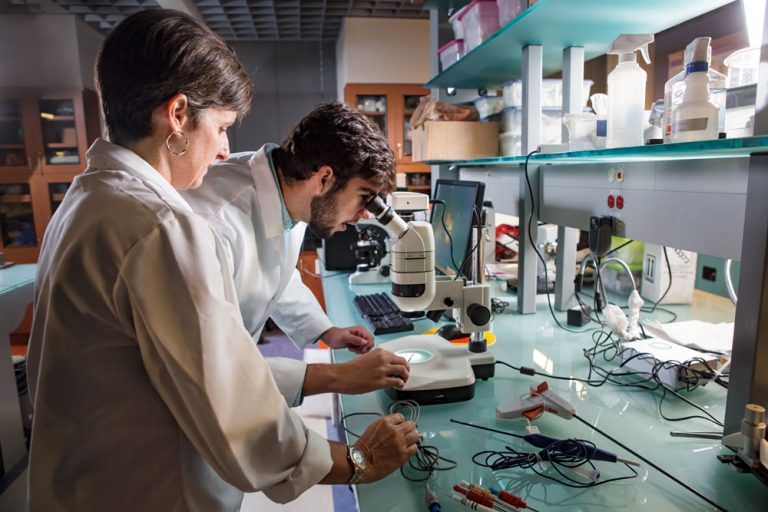How South Carolina Brings its A-Game in Life Sciences
Talented workforce, favorable business climate give South Carolina’s life sciences industry a boost

To get a sense of the impact the sector has on the state’s economy, just look at the numbers. More than 15,000 South Carolinians are employed in the life sciences industry, and more than 400 life sciences companies call the Palmetto State home. That amounts to an $11.4 billion boost to the economy.
To get a sense of why South Carolina’s life sciences sector continues to grow into a national leader, again, consider the numbers. More than 60 colleges and universities, including the University of South Carolina, Clemson University and the Medical University of South Carolina in Charleston, contribute to the state’s workforce. The state’s research universities are not only pipelines for highly skilled talent, they also serve as incubators for new discoveries and help commercialize that research into new businesses and economic opportunity.
Find Out Why Entrepreneurship is Heating Up in South Carolina
An ‘A’ for Innovation
The Medical University of South Carolina (MUSC) boasts research expenditures of more than $250 million. Through its Foundation for Research Development it has executed more than 150 licenses for products and technologies, and spun out more than 50 startup companies. Recently, MUSC partnered with the Harbor Entrepreneur Center to develop PriMed, an intensive life sciences accelerator specifically for biotechnology and life sciences entrepreneurs.
Clemson University’s School of Health Research partnered with Greenville Health System (GHS) to develop CUBEInC (Clemson University Biomedical Engineering Innovation Campus), a 30,000-square-foot research and educational facility on GHS’s Patewood Medical Campus.
“CUBEInC was conceived as a place to join forces between Greenville Health System and Clemson to conduct clinically driven research to improve the lives of patients and to generate innovation for economic development in South Carolina,” says Martine LaBerge, Ph.D., professor and chair of bioengineering and executive director of CUBEInC.
“CUBEInC has the synergistic benefit of providing GHS with research scientists and Clemson with clinicians to build an effective health-care research enterprise providing expertise and talent for the medical device industry. It provides a source of experts for the medical device industry with knowledge about innovation and design, and it provides space to startup companies focusing on medical technology, and research and development aligned with the expertise of the Bioengineering Department at Clemson University.”
LaBerge says organizations such as CUBEInC can have a dramatic impact on the state’s life sciences industry in terms of educating a future generation of industry innovators, business leaders and entrepreneurs. She says that access to talent can not only position South Carolina as a global competitor and national leader in biomedical technology, but also help the state play a role in addressing national and global health disparity.
“South Carolina’s life sciences industry has access to experts in medical device technology innovation and contributes to training the workforce needed to provide them a competitive advantage in the marketplace,” LaBerge says.
Discover the Booming Business Climate that is South Carolina
Business-Friendly
In addition to a highly skilled workforce, and research and development assets, South Carolina boasts a number of industry resources that make it easier for both established and startup life sciences businesses to grow and thrive. The South Carolina Biotechnology Industry Organization (SCBIO), for example, offers expert business advice to entrepreneurs and fledgling companies on subjects ranging from business planning and marketing to patent application and license registration. The statewide organization also advocates on behalf of the industry to state and local governments, and serves as a vital networking tool for member businesses.
Such a favorable business climate has helped attract companies, such as Nephron Pharmaceuticals, a manufacturer of respiratory drugs and injectables that built a $300 million plant and headquarters in West Columbia and Greenville-based ChartSpan Medical Technologies, developer of a mobile and web-based chronic care management service. The latter is expected to create 500 jobs by 2019.
“This is an unbelievably exciting moment in ChartSpan’s evolution,” said ChartSpan CEO and cofounder Jon-Michial Carter in a press release. “We have a deep love and affinity for Greenville. The State Department of Commerce, the Greenville Department of Economic Development, NEXT and Greenville city leaders have helped us every step of the way. Our ability to expand in the downtown area of Greenville is a reflection of a remarkably strong and collaborative partnership established for businesses by NEXT and supported by the city of Greenville and the Greenville Area Development Corporation.”
